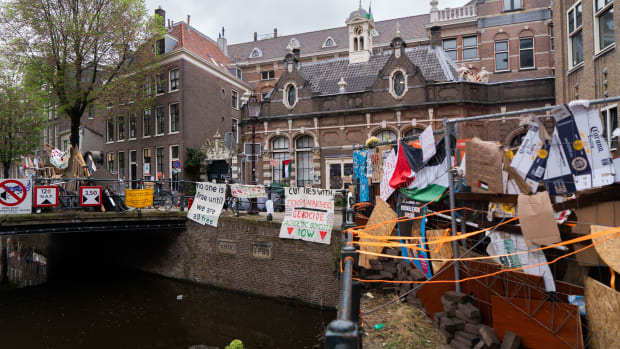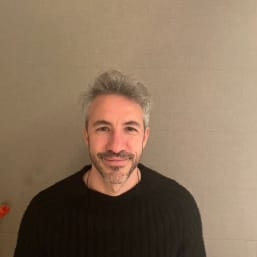
The lesson the UvA can learn from recent protests
Students involved in the recent demonstrations do not feel “politically powerless” and “ignored,” writes psychology lecturer Jos Verbrugge. “They are asking the academic community, the last bastion of reason, to support them in their struggle to be heard again in a political reality that is increasingly emphatically governed by emotion and a questionable moral compass.”
What possessed the psychology student who threw a smoke bomb on May 4th, 1969, on National Remembrance Day on Domplein in Utrecht? He did so in protest against the war that our American ally was waging in Vietnam. The incident recently received renewed attention in the national media during the tense run-up to this year’s National Remembrance Day due to the war in Gaza. That the thrower of the smoke bomb was a psychology student was not mentioned, but I happen to know, as it was my father.
Fifty-five years and nine days later, I had to cancel my class halfway through because of the escalating demonstration on the Roeterseiland campus. Some of my first-year psychology students rolled their eyes at the demonstrators’ inability to behave while I paternally walked out with them for the sake of their safety. Only later did I hear the stories of colleagues who had to leave their workplace under threat from masked activists, who had to watch activists with axes, who had volunteered as a BHV worker in case someone was injured during the police evacuation, and of colleagues who had stood in the street sobbing.
I suddenly realized which side I, the son of a former activist, had landed on: that of the establishment.
The destruction and escalation that occurred Monday after an “orderly” demonstration, as President of the Executive Board Geert ten Dam called the walk-out, was clearly planned. Consequently, the University of Amsterdam has since announced that it no longer wants to negotiate with the activists, but will continue the talks “through the usual channels.”
At first glance, this seems like a perfectly justified decision. The administration is responsible for providing a safe working and learning environment and some employees and students now feel unsafe. Also, if, as a protester, you endanger safety but then refuse to engage in the conversation, then you are no longer participating. Still, the question is: What can we as a university learn from these events?
The intuitive reaction to this refusal to talk is to find it infantile, narcissistic, and undemocratic. It isn’t just (radical) right-wing tweeting politicians who think this way. Many administrators, employees, and students of a supposed left-wing stronghold like the UvA agree. For example, Arnoud Boot, professor of corporate finance and financial markets at the UvA, stated in an emotional and inspired speech on BNR radio that dialogue is the only way out of conflict. In his speech, Boot also warned about the reaction that this way of campaigning provokes. He identifies an international trend of growing repression against voices of protest and implies that this aggressive way of demonstrating provokes it.
But in doing so, the Board and Boot ignore the fact that some students clearly no longer trust the “usual channels.” For them, the repression Boot talks about has long been a reality. For example, Harriët Bergman, who was involved in the 2014 Maagdenhuis occupation, warned the protesters in the Parool that they should not be brushed off with a promised dialogue. “The UvA has rigged up a few committees, including on democratization, diversity, and decolonization, but it turned out to be mostly lip service. [...] Stick to your demands, and follow your own moral compass,” she advised the current activists.
You’ve made your point and now we’re back to business as usual is something the hard core of current activists will not want to settle for.
In the eyes of today’s activists, participation has become a textbook example of what philosopher Marcusse, also popular in the 1960s, called “repressive tolerance,” defined as a process in which minority interests are neutralized so that they do not result in the desired changes.
To understand how it got to this point, it helps to take a moment to consider the political reality in which the current generation of activists grew up. They are the young people who a few years ago had to sacrifice an important formative period of their lives for society. Precisely at the moment when they should have started shaping their independent lives as adolescents, they were bound to their homes by lockdowns and regulations. Their first experience with political power was that participation no longer matters when the need arises.
On the other hand, they observe that what they see as compelling emergencies do not lead to the same political decisiveness. Migrants continue to drown in the Mediterranean, the climate continues to heat up, Israel continues to kill civilians unhindered, and surrogate parents are still not helped. Becoming politically active also makes no sense, because for years a cordon sanitaire has surrounded the only political parties that in any way share their views in the House of Representatives, and their ideas are consistently dismissed as “woke” and “cancel culture.” When that is the only political reality you know, it is hard to keep faith in democratic dialogue.
Added to that, in their experience, the participation in university policy that was so hard-won in the 1960s has little effect. My father could still take 10 years to complete his studies, but nowadays as a student, you are pushed through the program in four years under high pressure. As a result, you hardly have time for political activities, and before anything has changed, you have long since graduated.
The current split within the UvA shows many similarities with the clashing interests in the emerging cabinet. There, too, you see a tendency to seek a solution in better procedures and more participation and show more decisiveness by bypassing those laws, rules, or participation.
But saying “That is politics and the university is not a political body,” is a common reaction. Within the UvA, for example, petitions are circulating with opposing political positions on the conflict in Gaza or on political issues in general. From the other side came an e-mail from activists asking the psychology department for psychological help after the traumatic experience of the eviction.
In many people’s minds, there must have been a small explosion about the schizophrenic nature of that call. First to beat the crap out of people and then to ask the same organization for psychological support. But when you read the e-mail as a cry for help from a generation that feels politically powerless and ignored, it suddenly makes perfect sense. These are students asking the academic community, the last bastion of reason, to support them in their struggle to be heard again in a political reality increasingly emphatically governed by emotion and a questionable moral compass.
At least part of that generation, then. Another and perhaps much larger part of the students shrug their shoulders and roll their eyes. They just want to study. That situation raises a question far more important and broader than whether a university should take a political stand: Is it a university’s job to ensure that its students continue to have faith in laws, procedures, and democratic dialogue? After all, whether or not a university takes a political stand, the fact remains that it is training the political leaders and commentators of the future.
That is a big responsibility and requires a university that does more than repeat the importance of “open debate” as a mantra. It requires that an organization examine itself as to its democratic character and the effectiveness of its participatory bodies, not as it is perceived by administrators, but as it is perceived by students. Indeed, the choices made therein are an important blueprint for our political future.
My father threw a smoke bomb out of a deep sense of powerlessness, of not being heard. The protests of the 1960s eventually led to more open dialogue and greater student influence on university policy. It is to be hoped that the current protests will also lead to changes that allow students to once again experience that participation and dialogue actually lead to something. Otherwise, with the current disinterest on one side and escalation on the other, the future of that valuable open dialogue does not look too bright, to say the least.
Jos Verbrugge is a Psychology lecturer and prospective OR member of the FMG.

